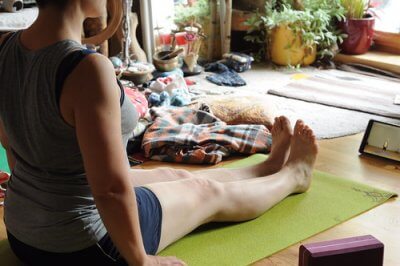Yoga For Depression – Does it Help?

By: distelfliege
Exercise is now recommended for depression. But suffering from depression lowers energy levels. Yoga, a more gentle form of exercise, can seem attractive.
But does yoga for depression actually work? And if so, how much yoga would you have to do?
Writer Anne Freier takes a look.
Research supports yoga for depression
A recently released study from Boston University’s School of Medicine (BUSM) looked at the effect of different “dosages” of yoga and breathing exercises on improving symptoms of clinical depression.
What is a ‘dosage’? Chris Streeter MD, associate professor of psychiatry at BUSM explains, “We give medications in different doses in order to enact their effects on the body to varying degrees. Here, we explored the same concept but used yoga. We call that a dosing study.”
Thirty study participants, all clinically depressed, were split into low and high “dosage” groups.
Over a three-month period, the low-dosage group attended 87 hours of yoga. The high-dosage group took part in 123 hours of yoga.
Within the first month of the trial, both groups saw significant improvements in depression reduction and overall mental wellbeing. This positive effect then increased over the next two months.
What’s fascinating about this experiment is that the dosage didn’t appear to matter much. The measured improvements were only marginally different.
In other words, a little bit of yoga goes a long way.
Yoga and mindfulness – a recipe for better mental health?
Many yoga teachers talk about listening to your breath, keeping your attention on your body, and ‘being present‘, This is also called staying ‘mindful‘.
Mindfulness is a mental state of deliberate self-awareness. It focuses on your feelings and sensory experiences in the here and now. With focus and practise, mindfulness can even be an everyday, informal type of meditation. You can practice it while queuing for the bus, or brushing your teeth.
In therapy, ‘mindfulness intervention’, refers to the practice of achieving a mindful state in order to treat anxiety, depression, and other mental health conditions.
So choosing a yoga class with a focus on staying present over just exercising might increase your mood boost.
How much mindfulness does research show you need?
Is mindfulness like yoga? Do you benefit no matter how much time you practise, and what ‘dose’ you use? Or do you need to start a committed mindfulness meditation practice to really see results? Studies from this angle are still rare.
But a 2017 study from Spain’s San Jorge University did examine the effects of different durations of mindfulness therapy. And it came to the conclusion that initial gains from mindfulness could be made relatively fast.
In the study, one group of 45 people was put on an eight-week mindfulness program, while another group of 45 people received an abbreviated four-week version. Both groups were followed up with after six months.
The positive effects of the longer program on depression, anxiety and other conditions were only slightly stronger than those of the shorter mindfulness intervention.
After an initial boost in mood and depression symptoms, the long-term effect continued to be cumulatively positive, but the upward slope appeared to become more gradual.
As for the ‘dosing’ of mindfulness interventions? How many times a day and for how many minutes each time you ideally need to practice mindfulness?
Experts have yet to find common ground. And different mindfulness teachers or therapists integrating mindfulness in their work with clients will offer different guidelines, depending on your personal requirements.
[Ready to jump in and benefit from mindfulness? Read our easy how-to Guide to Mindfulness to get started.]
The Power of the First Step
Perhaps one key mechanism the above research shows is that the decision to take action alone is enough to give you a morale lift.
After the first few mindfulness therapy sessions or yoga classes there’s also a sense of accomplishment. You proved to yourself that you can do it. This, in turn, will reinforce your commitment.
Mindfulness-based therapy
Not sure you have the motivation to try yoga for depression or mindfulness by yourself? You can work on the mindfulness side of things, at least, with a therapist.
One tried and tested non-medication treatment to cope with clinical depression is mindfulness-based cognitive therapy (MBCT). Research shows that most patients, MBCT produces tangible results within the first month of treatment.
Other therapies that often integrate mindfulness can include:
- integrative therapy
- transpersonal therapy
- acceptance and commitment therapy (ACT)
- dialectical behaviour therapy (DBT).
Ready to work with a therapist who integrates mindfulness? We connect you with top mindfulness-based therapists in central London locations. Not in London? Use our booking platform now to find UK-wide registered therapists or online counsellors you can work with globally.
Want to share your experience about using yoga for depression? Use the comment box below.
 Anne Freier is a medical and science writer. She has an MRes in Biomedical Research and a MSc in Neuroscience & Neuropsychology.
Anne Freier is a medical and science writer. She has an MRes in Biomedical Research and a MSc in Neuroscience & Neuropsychology.
REFERENCES
Scott, Tammy et al. Psychological Function, Iyengar Yoga, and Coherent Breathing A Randomized Controlled Dosing Study. Journal of Psychiatric Practice, 2019 DOI: 10.1097/PRA.0000000000000435
Pilkington, K., Kirkwood, G., Rampes, H. and Richardson, J. (2005). Yoga for depression: The research evidence. Journal of Affective Disorders, [online] 89(1–3), pp.13–24. Available at: https://www.sciencedirect.com/science/article/abs/pii/S0165032705002570.
Demarzo, M., Montero-Marin, J., Puebla-Guedea, M., Navarro-Gil, M., Herrera-Mercadal, P., Moreno-González, S., Calvo-Carrión, S., Bafaluy-Franch, L. and Garcia-Campayo, J. (2017). Efficacy of 8- and 4-Session Mindfulness-Based Interventions in a Non-clinical Population: A Controlled Study. Frontiers in Psychology, 8.
Creswell, J.D. (2017). Mindfulness Interventions. Annual review of psychology, [online] 68, pp.491–516. Available at: https://www.ncbi.nlm.nih.gov/pubmed/27687118 [Accessed 15 Oct. 2019].





